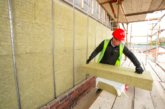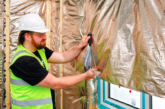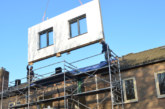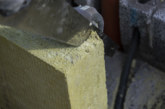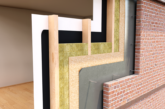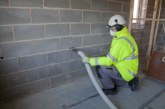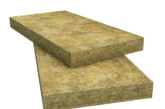
In the Autumn of last year insulation specialist Mark Group went into administration. Following a management buyout a new company BillSaveUK, emerged with a focus on the supply and installation of cavity and loft insulation for new homes to construction companies. PHPD chats to Bill Rumble, Director at BillSaveUK to find out about the company’s progress and how it is helping housebuilders create more energy efficient homes.
Q: The last 12 months have seen a lot of changes for the company – how has BillSaveUK positioned itself within the construction market to take advantage of the opportunities in the sector?
I think it would be fair to say we’ve taken an approach which is 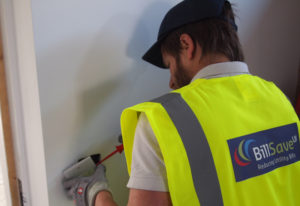 confident, yet cautious. Coming through an administration and buyout process is exhausting, but the opportunities which lie ahead for us in the construction sector are extremely exciting. Mark Group (or Mark Insulations as it was known by many) clocked up four decades in the energy saving industry and had established relationships in place with some of the biggest names in the new build sector. We’ve managed to transfer many of those existing business agreements across to BillSaveUK, but of course have been working hard over the past 10 months to generate new ones.
confident, yet cautious. Coming through an administration and buyout process is exhausting, but the opportunities which lie ahead for us in the construction sector are extremely exciting. Mark Group (or Mark Insulations as it was known by many) clocked up four decades in the energy saving industry and had established relationships in place with some of the biggest names in the new build sector. We’ve managed to transfer many of those existing business agreements across to BillSaveUK, but of course have been working hard over the past 10 months to generate new ones.
We agreed from the outset that our focus would be on customer service, ensuring work is done properly, on time and to the complete satisfaction of our clients. Communicating and delivering on this message, combined with our national network, our first class training facilities and our collaboration on new energy saving technologies, is what we believe has secured our market share – insulating one in five of all new homes built.”
Q: What are the range of services you offer housebuilders?
Insulation is currently the bread and butter of our business. We insulate lofts using glass mineral wool or rigid board products depending on the build type. Then there’s cavity wall insulation, either as blown mineral wool or bead, the latter being a popular choice for luxury and small scale developers. And of course we insulate timber frame properties – another discipline which requires specialist training and is fully catered for at our Academy.
What many house builders don’t know about us however is that we offer other services in addition to insulation. We install solar PV systems, in fact we’re currently working on a battery storage product with one of the big six utility providers. We have a scaffolding division and have recently launched an electrical services offering – this handles first and second fix requirements as well as installing a whole range of energy efficiency devices including LED lighting, voltage optimisers and smart thermostats.
Q: How would BillSaveUK work with a housebuilder to help ensure the correct type and levels of insulation are fitted?
Well the first thing we do is listen to builders, ensure we understand their requirements and then work with them to select the appropriate materials and develop an operational plan which slots into their build programme.
When it comes to choosing the products, this comes down to the ‘U-value’ they’re trying to achieve. Some builders install bead for a higher U-value, others might already have an agreement in place to use a particular material, so we work with all parties to ensure regulations are met. All products must be British Board of Agrément (BBA) certified and rated to a K or Lambda value which the house builder will specify.
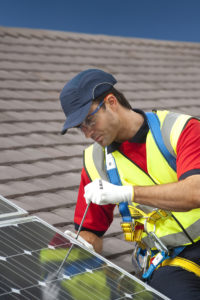 In terms of ensuring we get the installation process right, cavity wall insulation installers have to be accredited by the BBA and qualified by the insulation system designer. They will be trained in the appropriate drill pattern to use and on the density tests specific to a product – basically ensuring the blown material is evenly distributed within the wall and the correct amount of material is injected.
In terms of ensuring we get the installation process right, cavity wall insulation installers have to be accredited by the BBA and qualified by the insulation system designer. They will be trained in the appropriate drill pattern to use and on the density tests specific to a product – basically ensuring the blown material is evenly distributed within the wall and the correct amount of material is injected.
On a plot by plot basis, individual requirements form part of the installer’s instructions. This includes the material required, cavity depth, meterage to be insulated and a record of the density measurement made by the installer.
For lofts, again the specification and depth of material will be requested by the house builder and the installer would be fully instructed.
Q: What level of importance do you see buyers placing on having an energy efficient homes?
There is expectation that a new build house will be energy efficient. One of the reasons people choose to buy newly-built homes is because they’re relatively easy to run and maintain compared to many older properties – and that includes having a higher than average EPC rating. And as buyers become more savvy they’re asking about solar PV, smart meters and LED lighting in the same way they’ve come to expect double glazing, insulation and energy efficient boiler as standard.
Q: Are you witnessing a shift in the types of homes being built – are more timber frame and panelised systems now being used?
Timber frame is without doubt the fastest growing construction method in the UK. The Timber Trends report published by the Structural Timber Association (STA) analysed the market share of timber frame housing from 2013 and forecasted growth to 2017. It showed a steady increase in house starts since 2013 and expects 27% of new housing by next year to be timber frame.
From our own experience, we’re seeing a constant level in demand for insulating timber frame properties, but there’s very much an educational job to be done. Many builders are still employing their on-site labourers to insulate timber frame structures but financially, this just doesn’t stack up. It’s far more cost-effective to call in a professional installer who’ll ensure the job is done properly and remove other hassles such as sourcing materials, site storage and reduce wage costs for the builder.
Q: As an insulation specialist do you find house builders are completely aware of the insulation requirements of the latest Building Regulations?
Regulations are set by the local Building Control and NHBC before we receive an invitation to tender or work on the site has even started. So, we quote against the request from the builder. We find most loft insulation requirements are fairly standard now – 400mm depth, although some builders are starting to look at increasing that to 450mm or 500mm. Cavity wall insulation is typically 100mm if we’re using a blown product – normally 0.34 fibre.
Q: Many are forecasting a slowdown in the UK construction market following the vote to leave the EU. What is your view on the future of UK house building?
Uncertainty affects all business. In the first couple of weeks after the Brexit vote, speculation ruled. Now though, it feels like confidence levels amongst our clients and their customers is building.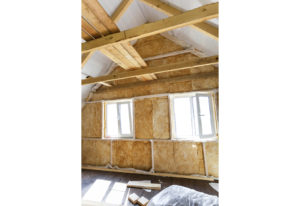
I draw comfort from the fact that Teresa May’s government appears to be supportive of the house building industry, understanding its importance to address the housing defect and as an engine for the economy. Ultimately, the prevailing market drivers for the new build industry remain and are as acute as ever.

